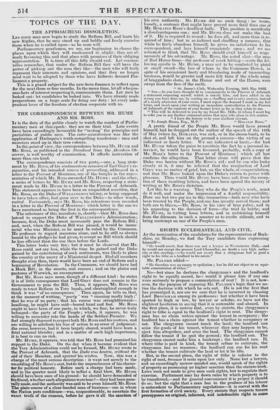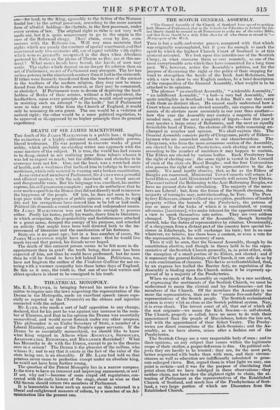RIGHTS ECCLESIASTICAL AND CIVIL.
AT the nomination of the candidates for the representation of Berk- shire, on Monday, we find the .Tory candidate thus expressing himself— "He would assert, that there was not a lawyer in Westminster Hall,—and he would not except the present Lord Chancellor, no doubt a very high autho- rity at this meefing,—who would not assert that a clergyman had as good a right to his tithe as a landlord to his estate."
Mr. PALMER added— "He therefore was an enemy to spoliation ; but he did not object to an equi- table commutation of tithes."
No—but since he declares the clergyman's and the landlord's right to be equally sacred, lion' would it please him if any one were seriously to propose a commutation of rent ? It is not, how- ever, for the purpose of exposing Mr. PALMER'S logic that we no- tice the doctrine with which he sets out. He is not the first that has promulged it, nor are we sure that he is incorrect in classing Lord BROUGHAM among its professors: but whether it have been sported by high or low, by lawyer or scholar, we have not the slightest hesitation in saying that it is untenable and absurd. In the first place, it is untrue that, even by statute, the clergyman's right to tithe is equal to the landlord's right to rent. The clergy- man has no claim unless against -the tenant in occupancy; the landlord has a claim against the tenant whether in occupancy or not. The clergyman cannot touch the land; the landlord can seize the goods of his tenant, wherever theymay happen to be, eject him altogether, and seize the land. The clergyman cannot follow the tenant if he, quit the ground; the landlord can. The clergyman cannot make him a bankrupt ; the landlord can. If, where tithe is paid in kind, the tenant refuse to cultivate, the clergyman has no resource; the landlord can sue for his rent whether the tenant cultivate the land or let it lie idle.
But, in the second place, the right of tithe is inferior to the right of rent, because it rests upon law only. None but a lawyer, and an exceedingly narrow-minded one, would speak of the rights of property as possessing no higher sanction than the statute-book. Laws were not made to give men such rights, but to regulate their exercise. Parliament may lay down rules by which property is to be transferred,—and for general convenience it is proper it should do so; but the right that a man has to the produce of his labour is antecedent to Parliamentary regulations—it is coeval with-the first formation of civil society. Every statute that respects tenure presupposes an original, inherent, and indefeasible right in some orie==fortand; in-ttse- King, agreeably to the fiction Otthe Norman feudal law; in the actual possessor, according to the more ancient form of ollodial holding—for chattels, in the firstpossessor, under every system of law. The original right to tithe is not very well made out, but it is quite unnecessary to go to the origin in the case of the Reformed clergy. Their claim, even by law, com- mences with the Reformalon. Will any man maintain that rights which are purely the creature of special enactment, and that enactment only two centuries old, are of equal validity with rights Which were as generally recognized in the days when Abraham pastured his flocks on the plains of Mature as they are at this mo- ment? What men's hands have bound, the hands of men may untie. The rights which depend on no deeper foundation than an act of Parlianient, an act of Parliament may abrogate. The law has no less potency in the nineteenth century than it had in the sixteenth. If tithes were formerly transferred from the teachers of the ancient to the teachers of the modern religion, they may now be trans- ferred from the modern to the ancient, or „they may be commuted, or abolished. If Parliament were to dream of depriving the land- holders of Berks of their estates, without a full equivalent, the landholders, upon every principle of justice, would stand acquitted in resisting such an attempt " to the knife ;" but if Parliament were to take away tithe from the Chinch of England, it would only be resuming its own grant. The one would be a violation of natural right; the other would be a mere political regulation, to be approved or disapproved by no higher principle than its general expediency.



























 Previous page
Previous page